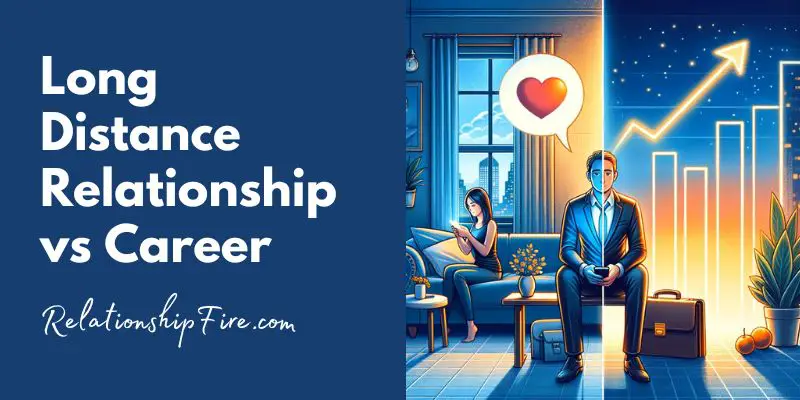The commitment and sacrifice required for a long-distance relationship (LDR) can often seem at odds with the ambitious drive needed for career success.
Yet, each path holds the potential for profound personal fulfillment.
So, long distance relationship vs career: what should you choose?
When choosing between a LDR and a career, assess long-term goals, willingness for sacrifice, and value priorities. Both paths offer unique growth and challenges, and decisions may shift over time. There is no right or wrong answer. Choosing one now does not mean choosing it forever.
In this article, you will learn everything you need to know to make your choice.
LDR vs Career: Understanding the Dilemma

The dilemma between an LDR and career advancement is a multifaceted one.
In an LDR, the emotional connection must weather the tests of time and distance, while career advancement often calls for a different form of dedication—where success is measured in achievements and professional milestones.
Having been through both, I can say that choosing between an LDR and a career is not just about present circumstances but also about where you see yourself in the future.
Both choices require one to consider what sacrifices they are willing to make and what they aspire to achieve in the long run.
Pros of a Long-Distance Relationship
Choosing a long-distance relationship comes with a surprising array of benefits:
- Enhanced Communication Skills: Distance necessitates a level of communication that can strengthen the relationship.
- Trust Building: The essence of an LDR is trust, which can create an incredibly strong foundation for the future.
- Personal Growth: Time apart can lead to individual growth, as each partner has the space to pursue their interests and goals.
- Appreciation for Time Together: When reunions occur, they are often more intense and meaningful.
Expanding on these, an LDR can truly refine the way you communicate.
You learn to convey your thoughts and feelings succinctly and to interpret your partner’s words with sensitivity.
Trust becomes your cornerstone, for without it, the relationship would crumble under the weight of distance. This trust fosters a resilient bond that is hard to shake. Furthermore, the independence gained can be empowering.
You develop your sense of self, often discovering new hobbies or interests that you may not have explored otherwise. \
Lastly, the reunions are like a breath of fresh air, where every second counts, making the relationship feel even more precious.
Cons of a Long-Distance Relationship
However, LDRs are not without their significant challenges:
- Emotional Strain: The absence of your partner can lead to feelings of loneliness and sadness.
- Communication Barriers: Texts and calls can’t fully replace face-to-face interactions, leading to misunderstandings.
- Financial Pressure: The cost of maintaining an LDR with visits can be high.
- Uncertainty: Without a plan to eventually close the distance, the relationship may feel unstable.
The emotional toll of an LDR is heavy (Trust me, I know).
Loneliness can often set in without warning, and the lack of physical closeness can leave a void that texts or video calls cannot fill.
Miscommunications can arise, turning minor issues into major conflicts.
The financial aspect is also non-trivial, as the cost of flights, accommodations, and other expenses related to maintaining an LDR can add up quickly, potentially causing stress and resentment.
Finally, the uncertainty of an end date to the distance can cast a shadow over the relationship.
All of this makes it difficult for both partners to plan their future with confidence.
Pros of Prioritizing Career
Focusing on career growth also has its advantages:
- Professional Advancement: A clear trajectory in your career path can lead to higher positions and better pay.
- Skill Development: Careers often offer opportunities for learning and personal development.
- Financial Security: With a steady income and potential for growth, financial worries can be mitigated.
- Networking Opportunities: Building a professional network can open doors to new opportunities and collaborations.
The professional world offers a clear and measurable sense of progression.
As you climb the ladder, each rung brings with it a sense of accomplishment and the tangible rewards of increased salary and recognition.
Your skillset expands as you face and overcome new challenges.
The financial stability that comes with a career can provide peace of mind and the means to build the life you want.
Plus, the network you build can support you both professionally and personally, presenting opportunities that might otherwise remain out of reach.
Here is a short video with more reasons to focus on your career over your LDR:
Cons of Prioritizing Career
Yet, there are drawbacks to prioritizing your career too:
- Personal Sacrifice: Time spent on career means less time for personal relationships and experiences.
- Stress and Burnout: High levels of responsibility can lead to significant stress or even burnout.
- Lack of Support: Without a partner’s emotional support, challenging times can feel particularly isolating.
- Missed Life Events: Prioritizing career might mean missing out on important personal milestones or events.
When your career takes the front seat, personal relationships often take a back seat.
Long hours and commitment to your job can mean less time for friends, family, and significant others, potentially straining these relationships.
The pressure to perform and achieve can be relentless, leading to stress and, in some cases, burnout.
If you’re solely career-focused, times of hardship can feel lonelier without a partner to lean on.
Moreover, career pursuits can clash with personal life events, causing you to miss out on key moments and experiences that define a shared human experience.
Questions to Ask Yourself
Contemplating this choice means asking yourself pivotal questions:
- What are my long-term goals?
- Can my relationship withstand the tests of time and distance?
- Am I prepared to make sacrifices for my career?
- What do I value more at this stage in my life?
For me, these questions were a guiding light, prompting deep reflection on what I envisioned for my future.
They helped me to weigh the significance of each path and to determine which aligned more closely with my aspirations and core values.
Long Distance Relationship vs Career: Why It’s OK to Choose Either Path
It’s crucial to recognize that either choice is valid:
- Alignment with Personal Goals: Your choice should reflect your goals and where you see yourself in the future.
- Opportunities for Growth: Both paths offer unique growth opportunities, whether personal or professional.
- Flexibility Over Time: Priorities can shift, and it’s okay for your decisions to change alongside them.
- No ‘One-Size-Fits-All’: Each person’s situation is different, making it essential to choose what’s best for you, not what others expect.
In making your decision, know that it’s more than acceptable to choose the path that best suits you at this moment in your life.
Whether that means nurturing a long-distance relationship or pouring your energy into career growth, both are journeys worth taking.
They each come with their own set of challenges and rewards, and what matters most is that your choice resonates with your personal values and visions for the future.
Remember, life is fluid, and the choice you make today can always be reassessed in the light of tomorrow’s dreams and circumstances.
Managing a Long-Distance Relationship and a Career
Finding equilibrium between a long-distance relationship and a career is akin to walking a tightrope—requiring focus, adjustments, and the occasional safety net.
Here’s how you can strive to maintain a balance:
Establish a Routine
- Set Regular Check-ins: Decide on daily or weekly calls and stick to them, making this a non-negotiable part of your schedule.
- Plan Visits in Advance: Coordinate your calendars to schedule visits, ensuring you have quality time to look forward to.
- Use Technology Wisely: Leverage apps that sync your schedules and reminders for important dates or deadlines.
Creating a routine provides structure and ensures that neither your relationship nor your career is neglected.
Regular check-ins become something to anticipate and prepare for, providing consistency that can help bridge the emotional gap.
Planning visits gives both parties something tangible to look forward to, making the time apart feel more manageable.
Utilizing technology can minimize the friction of coordinating across time zones and help keep track of each other’s important career events.
Communicate Openly
- Discuss Career Goals: Share your professional ambitions with your partner, fostering understanding and support.
- Express Needs and Boundaries: Clearly articulate what you need from the relationship and understand your partner’s limits concerning career demands.
- Problem-Solve Together: Address any conflicts between career and relationship goals as a team.
Open communication about career goals and personal needs helps to mitigate misunderstandings and builds a supportive environment.
Knowing each other’s career ambitions and the potential demands those ambitions may entail helps in setting realistic expectations for the relationship.
When both partners participate in problem-solving, it strengthens the relationship.
It also makes the partnership feel like a joint venture, not a solo journey.
Prioritize Quality Over Quantity
- Make the Most of Your Time: Focus on creating meaningful experiences during visits, rather than stressing about the quantity of time spent together.
- Be Fully Present: During your interactions, ensure that you’re fully engaged and not distracted by work or other commitments.
- Creative Communication: Send personal tokens, voice messages, or letters that can be more impactful than frequent texting.
Prioritizing quality over quantity means that the limited time you spend together or talking to each other is rich and fulfilling.
Being fully present allows both partners to feel valued and heard.
Creative communication methods can convey affection and maintain a sense of intimacy, making each interaction special and memorable.
Leverage the Benefits of Your Situation
- Use Time Apart Productively: Utilize the time you’re not together to focus on career tasks or personal development.
- Embrace Independence: Take advantage of the autonomy your situation provides to pursue goals or hobbies that you might not otherwise have time for.
- Support Each Other’s Careers: Encourage each other’s professional growth, celebrate achievements, and offer advice when needed.
The time apart can be seen as an opportunity to dive deep into your work or personal projects without feeling like you are neglecting your partner.
Embrace the independence for personal growth that contributes positively to the relationship.
Be supportive of each other’s careers. This kind of support strengthens the partnership and builds mutual respect.
Seek Outside Support When Needed
- Rely on Your Network: Lean on friends, family, or professionals for advice and emotional support.
- Discuss Your Struggles: Be open with your partner about the challenges you’re facing in balancing both aspects of your life.
- Consider Counseling: If the balance becomes too difficult to manage, seek the help of a counselor or therapist who specializes in long-distance relationships or work-life balance.
Having a support network is vital.
They can provide perspective, advice, and a listening ear when the balancing act becomes overwhelming.
Openness with your partner about these challenges can lead to solutions that you might not have reached on your own.
Sometimes professional help can provide strategies and tools to navigate the complexities of a long-distance relationship while pursuing career goals.
Final Thoughts: Long Distance Relationship vs Career
In the tango of love and labor, only you know the rhythm to which your heart beats. Now, sashay over to our other articles and let your curiosity dance across the pages.
Read This Next:
- 22 Things To Do When You Miss Your Long Distance Boyfriend
- Long Distance Touch Ring (Ultimate Guide for Couples)
- What Is a Long Distance Lamp? (Explained)
- What Is a Long Distance Relationship Bracelet? (Explained)
- Are Long Distance Breakups Easier? (10 Things You Must Know)

